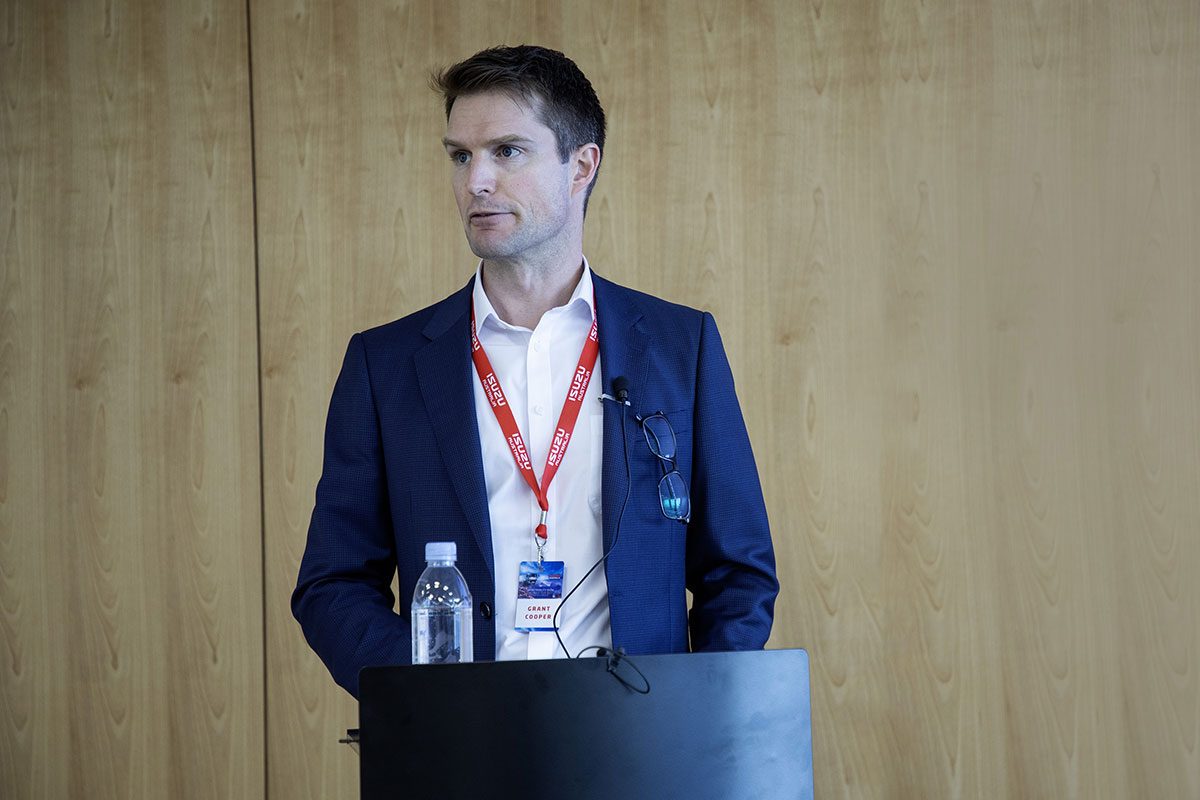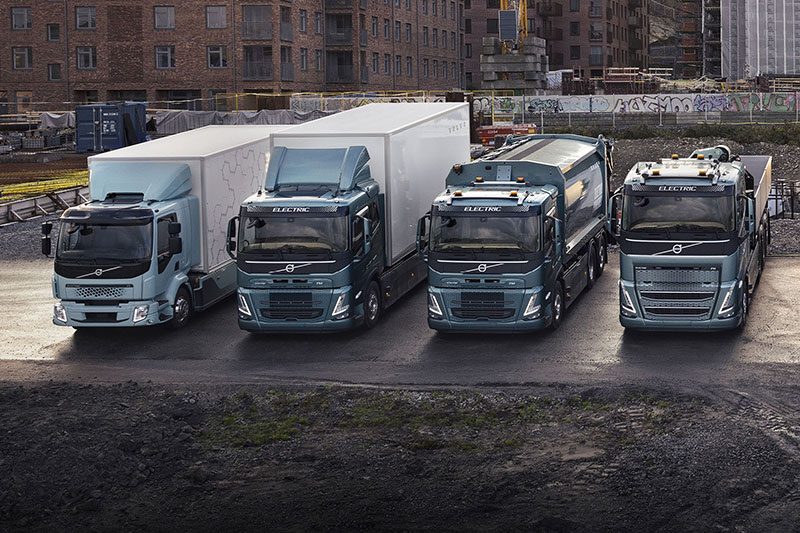INCOMING CARGO – WE ARE UNSTOPPABLE
Iveco came out of 2019 on a high and the company is hell-bent on carrying this momentum forward through the forthcoming years – global health pandemics notwithstanding. Chairman of the International Truck of the Year jury, Gianenrico Griffini, brings us an exclusive interview with the company‘s new brand president, Thomas Hilse.
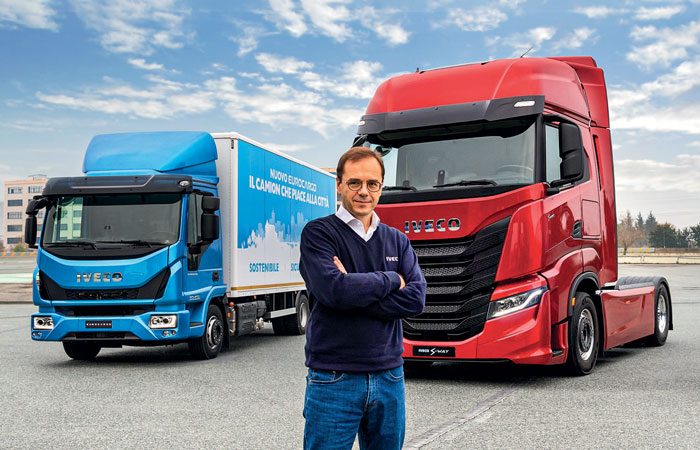
How are you translating CNH Industrial‘s Transform2Win strategy into reality?
Fundamentally, Transform2Win will create an on-highway company focused on trucks and powertrains, based on the solid strategy that Iveco has been pursuing for the past year. The evolution of our product portfolio is on track and moving fast. What we have achieved in just a year is quite amazing and by the end of the year we will have a completely renewed product portfolio across all segments. In April 2019 we launched the new Iveco Daily, with advanced driver assistance systems and connectivity. Then in July we launched the Iveco S-WAY, which I think surprised the industry and our customers. At the end of last year we announced our cooperation with Nikola on hydrogen and battery electric trucks. I think that we again surprised the industry with this move and with the remarkable speed of delivery: just three months after we signed the agreement, we presented a prototype. And there is more to come later this year when we will launch the Iveco T-WAY, our off-road vehicle and the successor to the Trakker. Another part of our strategy is the renovation and reorganisation of our entire service network, which fits with the repositioning of our heavy-duty line. We have established a network of dedicated heavy-duty truck stations across Europe to deliver a highly professional service to our customers and maximise the uptime of their vehicles, and these are operating very well. Then, of course we are continuing to look at our quality situation, which has dramatically improved. Last but not least, is our quantum leap in connectivity, which will play a key role in how we will provide our customers with the best TCO and fleet management capabilities into the future. We now have our state-of-the-art infrastructure and product, and we will be launching additional connectivity features over time, continuously raising the bar on benefits for our customers.
A top priority for Iveco is the repositioning of heavy-duty trucks. Is the new Iveco S-WAY the right product to achieve this target? What feedback have you received so far?
Yes, the Iveco S-WAY is the right product. The feedback we are receiving from our customers tells us that it is. They see the progress in Iveco‘s heavy-duty proposition. What‘s more, large fleet customers who had moved to other brands are now coming back to us for two main reasons: they like the Iveco S-WAY, its product concept, the cabin, which is amongst the best, and it is a very good-looking truck. The second reason is that we are the leader in LNG technology, a solution that we have pioneered for the past 20 years. Our drivers, too, really like the Iveco S-WAY; they talk about it a lot on social media. This is also confirmed by our market share. Before the crisis, in the first three months of 2020 we increased our share of the European market by around 2%. This is a remarkable achievement in a very competitive segment. This is only the beginning, because the Iveco S-WAY is still in the launch phase. Our second-generation LNG vehicle is coming now, bringing a further technological improvement on the Stralis LNG. This year we will also launch the right-hand drive version and we will complete the whole Iveco WAY family.
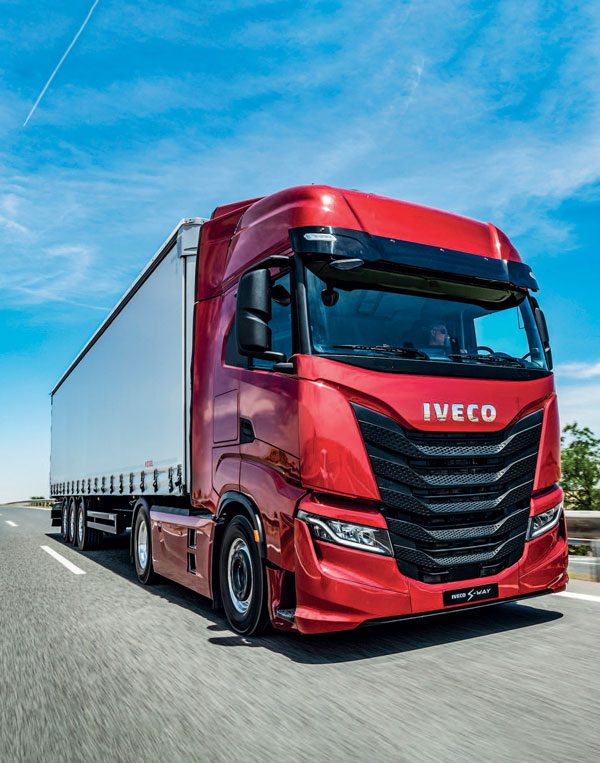
Photo: High quality, dashing good looks, solid engineering, technologically connected – the Iveco S-WAY is at the head of an entire new product range driving Iveco‘s future strategy.
What about bio-LNG, is it the right solution to manage the energy transition from a traditional diesel engine truck to battery electric or fuelcell electric vehicles?
I believe that bio-LNG will be the rocket launcher to reach the moon. It is the only zero-emission alternative currently available on the market. In the past two years we have seen roughly 2.5% of the heavy-duty market make the transition to LNG technology, and I believe that it will increase to 5% in the medium term, and 10% over the next 10 years. The enabler for this growth is certainly the expanding LNG fuelling infrastructure across Europe: today we have about 217 stations, and the plan is to go up to between 450 and 480. It is clear that in 10 years‘ time there will be more choice for heavy-duty trucks: it won‘t be just diesel, or just hydrogen, or just LNG. There will be different solutions, depending on different customer applications and on the approach to the energy balance that the various countries will take. Pure electric trucks will account for a small segment and hydrogen will play an important role. There will be a market for LNG, which isn‘t just the bridge solution, but will continue to be a valid alternative providing a very interesting economical proposition. Very importantly, bio-LNG will make a huge difference when it comes to the market. In the past six months we have seen energy companies make announcements regarding this; for example, Shell has declared that its plans for bio-LNG will account for up to 30% of its LNG supply. Interestingly, many customers have developed their own bio-LNG sources. We are seeing a growing number of small bio-LNG producers, who are providing customers with the opportunity to operate their vehicles on bio-LNG, generating 95% fewer emissions than with diesel – and, at least for now, at the same cost. This makes a difference: major companies are coming on board to extend their green fleets, saying that for them bio-LNG is the only solution.
How do you plan to take full advantage of Iveco‘s LNG technology leadership in the major European markets?
I see a complete shift in our customers‘ mindset: we don‘t have to convince them of the environmental and economic advantages of natural gas any more, they already know and they are coming to us! I believe that post-Covid-19 this transition will accelerate. I think that it is an opportunity and we need to invest now in the technology and processes that will take us into the future. At Iveco we are working very hard with the automotive association and with governments to ensure that we use the crisis as an accelerator for these technologies. At the end of 2020 we will extend our portfolio through our cooperation with Nikola, with an electric truck that will be followed by the hydrogen version.
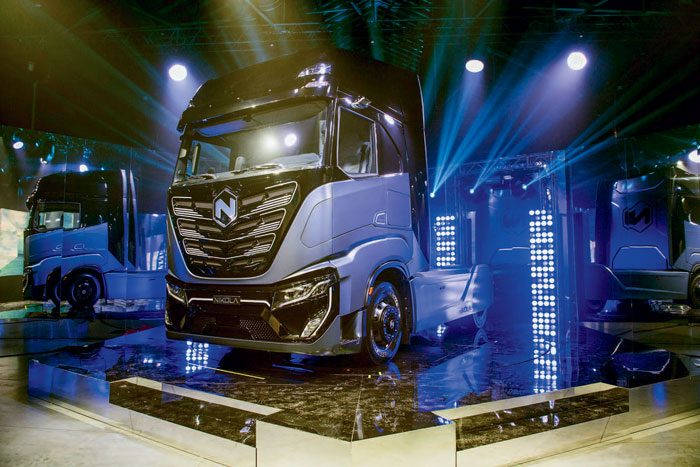
Photo: Come 2021, the Nikola Tre will move Iveco into the battery electric and fuel-cell electric vehicle sphere.
The Iveco and Nikola partnership: can you outline in some detail the next steps in introducing BEV and FCEV trucks in the market?
We are working full force with our American partners and we expect to begin testing later this year, as we announced. We recently communicated that the production location of the Nikola Tre in Europe will be Ulm, in Germany. This, I believe, is a very smart move for us: it is right in the heart of the European supplier hotspot for hydrogen, and in a state that is very supportive of this investment. We also have a very large part of our heavy-duty vehicle development team in Ulm. We are now working on the technical development of the vehicle. We are at a very advanced stage and on schedule to have the electric version of the Nikola Tre in 2021 and the fuel cell version in 2023. So there is no change; we want to be unstoppable here!
How important are connectivity and the related advanced service offer for Iveco‘s new product range?
We need to approach our offering from a customer‘s perspective, and for them, maximising uptime and reducing operating costs is the key. We need to be there for our customers as a partner, and this can‘t be done without professional and high-quality services and connectivity. That‘s why in the past 18 months we have completely overhauled the entire communication infrastructure on our vehicles. We now offer state-of-the-art technology, with more and more services that add value for our customers. These include our flexible maintenance and repair contracts, but also other very interesting services, such as fuel advice to help customers reduce their consumption. We can tell them how their drivers‘ driving behaviours influence their fuel consumption and give them recommendations on how to improve.
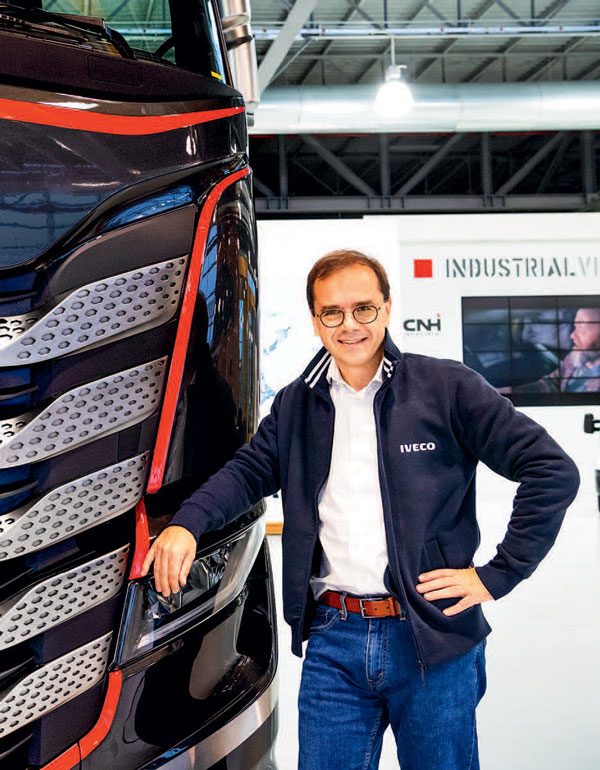
Photo: New brand president of Iveco Thomas Hilse is driving the company‘s Transform2Win strategy, which aims to increase the brand‘s competitiveness across the board.
How would you judge Iveco‘s results last year in the major European markets?
We achieved very good results. Iveco sold 125,000 vehicles, of which about 100,000 of these were in Europe. We are doing well in ‘the Daily segment‘, where we have been a market leader for 40 years. With our market share at around 12% on average, we are in a very good position in a segment that is set to continue growing. Post- Covid-19, we will see a change in customer behaviour around the use of the Internet and digitalisation, and the Daily is very well positioned to meet the new demands. Also, I believe that small businesses and the markets for last-mile delivery in this segment will come back quickly, and we are in a strong position to meet this demand. The Eurocargo is an excellent product, very versatile, and I think it will maintain its position in special applications in the public services and military environments. Our success going forward will depend on the Iveco S-WAY and the Iveco T-WAY. We have a 6% share of the heavy-duty market, and we touched 8% in February. I believe 2019 was the turnaround year for Iveco, and 2020 will hopefully be the accelerator when we come out of the Covid-19 situation. I am very much looking forward to the time, later this year, when we bring the Iveco T-WAY to the market too.
Can you give us an outlook for this year, despite the disruption of the economic activities caused by the pandemic? Is there any visibility on how the market will recover when the pandemic is over?
It will clearly depend on the course of the infection, but we all hope that any effects will be short term. I expect the market will be roughly 30 to 35% down against last year, but I believe that when all the governmental packages come to the table, the market will recover. I don‘t think we will witness again what happened in 2009 with the Lehman shock. The banking system is in good order and governments are reacting faster. As for Iveco, as a company we know what to do; we learned a lot from the last crisis and so I am feeling confident.
Read more
Road to Zero Isuzu styles
0 Comments6 Minutes
Ready for the harvest
0 Comments12 Minutes
VGA introduces electric
0 Comments8 Minutes
Celling’ the future
0 Comments14 Minutes


